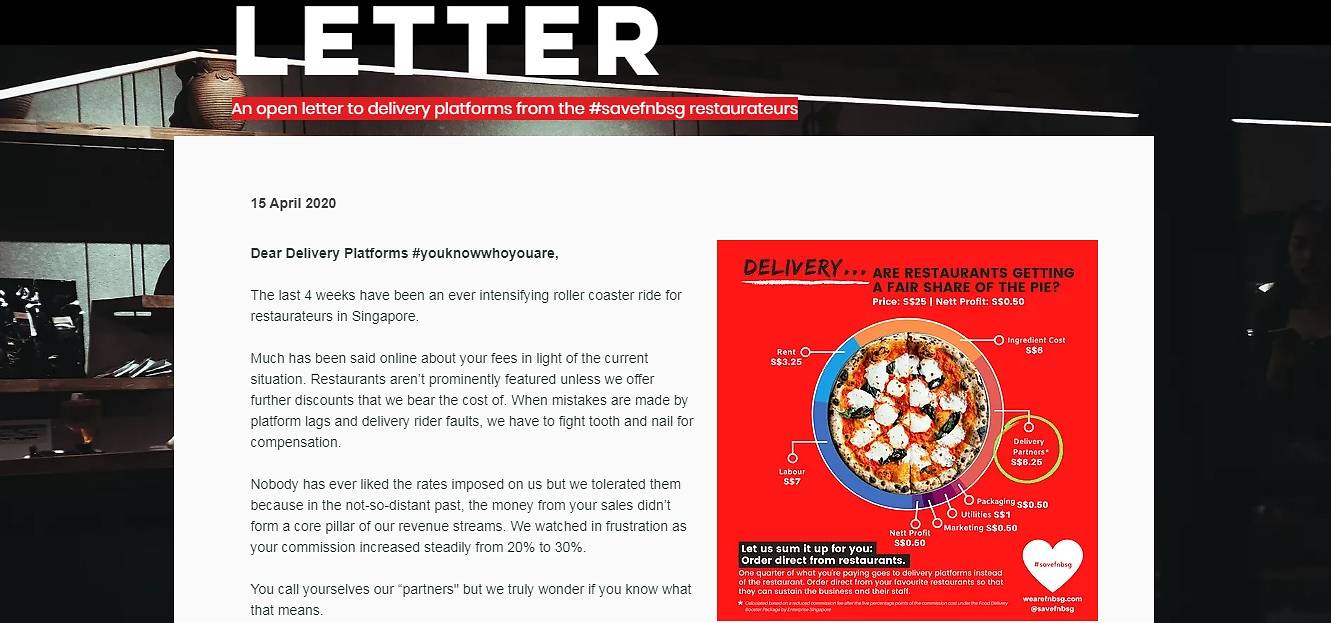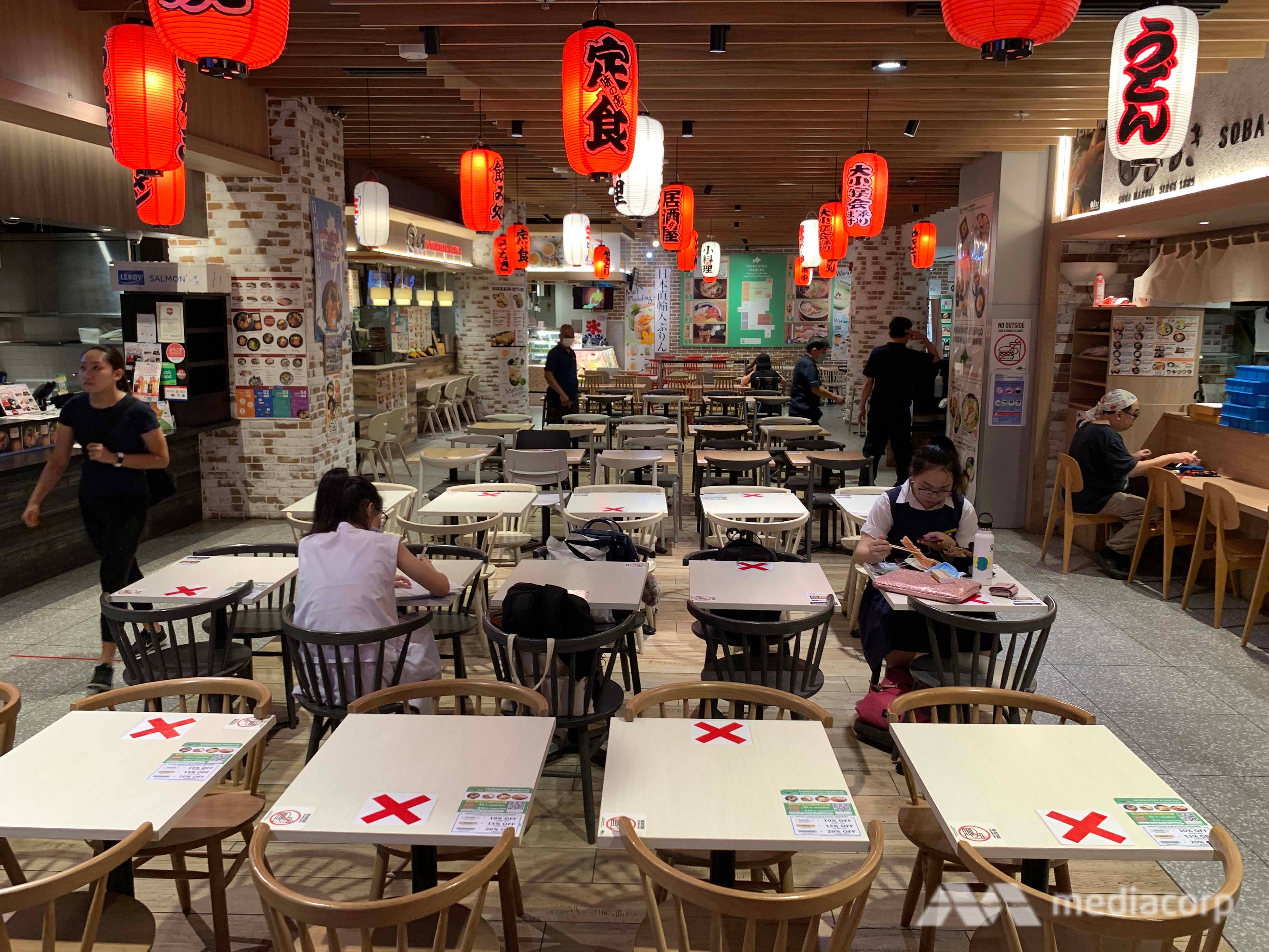SINGAPORE: The “very high” commission fees charged by food delivery platforms are eating into the already-thin profits of food and beverage (F&B) businesses, said an industry group as it called for these fees to be cut during the COVID-19 pandemic and in the longer run.
The Restaurant Association of Singapore (RAS), which has over 450 members, said current commission charges range from 25 to 32 per cent for each order.
“RAS hopes that the delivery platforms will lower their commission rates during the COVID-19 period and also in the longer run,” a spokesperson told CNA.
“Whether it is the circuit breaker period or not, the rates are not sustainable for the businesses given F&B’s razor-thin margins.”
In recent years, willingness from consumers to pay for convenience has whetted a growing appetite for meal deliveries in Singapore, spurring the growth of platforms such as foodpanda and Deliveroo.
While there were concerns about the steep commission fees, which can go as high as 40 per cent an order according to F&B owners that CNA spoke with, they were largely overshadowed by the lure of capturing a slice of a growing market.
But as F&B owners grapple with a sharp fall in revenue amid the COVID-19 outbreak, especially with stricter rules banning dine-ins until at least May 4, these fees have become harder to stomach and calls for lower fees have grown.
At least two Members of Parliament (MPs) have spoken out on this recently.
West Coast GRC MP Foo Mee Har described the commission fees as “an exorbitant one-third of customer receipts” and, citing F&B owners she spoke with, only “barely tolerable during peace time”.
As businesses become increasingly reliant on meal delivery services amid the virus outbreak, “payment of such commissions renders the sustainability of food establishments untenable”.
Speaking on Apr 7 during the Budget debate, Ms Foo urged delivery platforms to do their part by reviewing commission models so as to “foster more equitable sharing of costs and benefits”.
READ: Events postponed, restaurants ‘near empty’: F&B industry on the chopping block as COVID-19 measures bite
Also urging food delivery platforms to lower their commissions “especially during such unprecedented times”, Tanjong Pagar GRC MP Melvin Yong said current charges are “too exorbitant” for hawkers.
“In some cases, the commission fees exceed the hawker’s profit margins!” he remarked in an entry on the labour movement’s blog on Apr 4, adding that a lower fee would nudge more hawkers to sign up.
DELIVERY APPS WAIVE SOME FEES
Asked if they would lower their commission rates, the three biggest food delivery players in Singapore – foodpanda, Deliveroo and GrabFood – would only say they have various measures to help F&B businesses cope with the COVID-19 fallout.
For instance, they have quickened the onboarding process for new sign-ups amid increased demand. Deliveroo said it has onboarded around 100 new restaurants since Apr 3 and aims to double this number in the next two weeks.
Some related fees have also been waived, according to replies from these delivery players.
foodpanda said its onboarding process has been shortened to within 3 days and new vendors will not have to pay registration fees. It is also waiving commission fees for the first month for those who sign up between Apr 9 and May 4 and have one or two outlets.
Deliveroo will waive up to S$360 of onboarding fees, said its spokesperson. Meanwhile, a new weekly payment service begins later this month so that cash-strapped restaurants can have faster access to their delivery revenue.
GrabFood is waiving commission fees for self pick-up orders during the circuit breaker period and its other measures include creating a “Local Heroes” icon on its homepage to help increase the visibility of single-outlet F&B places.
(Photo: Facebook/Deliveroo Riders Singapore)
LOWER COMMISSION FEES TO 12-15%: RAS
Such measures do little to alleviate the woes of F&B operators, said restaurateur Loh Lik Peng who described them as “tactical promotions” to capture market share.
“Is this a fundamental change to the commission model? I would say no as it makes no difference in the long term,” he said, noting that rates of around 30 per cent “continue to be unsustainable” as they take a huge chunk out of F&B business earnings.
And amid the COVID-19 outbreak with a vast majority of F&B businesses already suffering “fairly steep losses”, many F&B operators are persisting with deliveries simply to “mitigate” further losses, he added.
Mr Loh noted how concerns about the steep commission fees charged by food delivery players have been raised in other countries. For instance, legislation has been introduced by the New York City Council last month to limit such fees at 10 per cent.
READ: Delivery fees, commissions cut as Americans stop dining out
“We do hope more can be done for the long term,” said Mr Loh, who is one of the founders of an informal F&B grouping called the #savefnbsg.
The group, made up of over 500 restaurants here, issued a statement on Wednesday (Apr 15) calling for the Government to consider mandating these commission fees.
Citing how city officials in San Francisco have issued an emergency order for delivery platforms to cap commissions at 15 per cent, an open letter on the group’s website said: “If the Singapore government can do likewise and mandate that delivery platforms lower their commission by at least 15 per cent, it will play a huge part in our survival.”
It has set up an online petition to rally for lower commissions, after watching “in frustration” as these rates “increased steadily from 20 per cent to 30 per cent”.
The strongly-worded statement also appealed to consumers to order directly from F&B operators instead.
“As restaurateurs, our appeal to you is: If you want your dollar to have the most impact in supporting the industry, stop ordering through these platforms.”

An open letter from the informal grouping #savefnbsg posted on Apr 15, 2020.
The RAS said a range of 12 to 15 per cent “would be more viable” for F&B operators here, in response to CNA’s question on how much commission rates should be reduced.
For the time being, it is encouraging restaurants to tap on a newly announced relief package from Enterprise Singapore which will fund 5 percentage points of the commissions charged by Deliveroo, GrabFood and foodpanda, with no cap on the food delivery transaction value, from Apr 7 to May 4.
READ: F&B businesses to receive support for food delivery orders with new Enterprise Singapore booster package
FINDING ALTERNATIVES
As the COVID-19 outbreak drags on, businesses are mulling alternatives.
Unlisted Collection, for instance, has tapped local technology start-up Oddle to build an online ordering system for its restaurants so that it can take orders directly via its websites. Oddle takes a 10 per cent cut from each order that is transacted on this system.
Mr Loh said his firm will “continue to look at Oddle as a preferred platform” given the lower costs.
Having a personalised ordering site also allows it to better engage customers, versus having to fight for attention with many other restaurants listed on the same marketplace, the entrepreneur added.
Mr Loh doesn’t seem to be alone as Oddle has seen 15 per cent more sign-ups since end-March, its chief financial officer Solomon Tan told CNA.
“In the past merchants will tell us ‘I’m already on food delivery marketplaces so that’s my online presence’. This changed after COVID-19.”
Oddle hopes to “empower” F&B operators with their own digital presence. More than just consolidating orders and payments, its system also provides analytics to help businesses determine the type of marketing needed. Oddle is also able to provide logistics support for meal deliveries.
“We want to help businesses to go online. This is something that I think has become a lot more important during COVID-19 when businesses realise they couldn’t address the market needs.
“To put it simply, they find themselves having to speak to a reseller in order to sell more, when they can just be trying to sell more themselves,” said Mr Tan.

Red crosses labelled on the tables at Hokkaido Marche in Orchard Central on Thursday (March 26) (Photo: Jeremy Long)
Other F&B owners have turned to doing their own deliveries by tapping ad-hoc riders or drivers.
One of them is DOCO – an eatery selling Japanese rice bowls in Tanjong Pagar. Its owner Ken Tan took to Facebook last week to search for drivers looking to earn additional income. He has since assembled five drivers who take on an average of 20 to 25 deliveries a day.
Drivers get to keep the delivery fees, which range from S$3 to S$10 depending on the distance.
“I’ll like to do more orders islandwide … and these drivers also need to earn an income. So I thought why not let’s try this out.”
Lau Pa Sat food centre at mid-day during the circuit breaker. (Photo: Jeremy Long)
GROUND-UP EFFORT FOR HAWKERS
For hawkers, many of whom have been deterred by the commission fees of food delivery platforms, a ground-up initiative which started on Facebook earlier this month has been seen as timely help.
Called the Hawkers United – Dabao 2020, the Facebook group allows hawkers to promote their menus, takeaway and delivery services for free.
Its creator, Mr Melvin Chew who runs Jin Ji Teochew Braised Duck & Kway Chap at Chinatown Complex, said most hawkers do not have accounts on social media platforms and are used to relying on walk-in customers.
Knowing that many will be badly affected by the dine-in ban and other “circuit breaker” rules, he knew he had to act quickly to help.
“That’s why I created a space where it’s free for all hawkers and some F&B outlets, and also welcome consumers who are interested in ordering from these stalls.”
The group has attracted nearly 220,000 members as of Apr 15 – a surprise for Mr Chew.
While there has been some “unwelcome” attention such as the set-up of a fake Telegram group, Mr Chew said he and his team feel encouraged when they learnt that some hawkers have since received “overwhelming” orders through the Facebook group.
The second-generation hawker is hoping to help more and has gone on to set up two other groups on the social media platform. One is targeted at wet market vendors – Pasar United – Dabao 2020 – and the other called Delivery United aims to help F&B operators locate deliverymen.
Most hawkers told CNA that they remain hesitant in signing up with food delivery platforms as the commissions remain “too high” even with the one-month funding from Enterprise Singapore.
Delivery platforms will need to lower their rates “by a huge margin” or offer the hawker community “a proportionate commission rate to sales”, said Mr Chew.
“If my duck rice is S$3 a packet and 30 per cent is deducted by the mega ordering platforms with delivery services, you can quickly calculate how little we get back. I still have to pay rent, utilities, suppliers, packaging etc.”
READ: From hawker centre to home: Is delivering cheap, local food a recipe for business success?
To be sure, there are start-ups that have been trying to disrupt the space by delivering hawker food.
WhyQ, which began operations in early 2017, does not charge commissions “considering the low cost of hawker fare”, said its co-founder Rishabh Singhvi.
Its revenue comes from the delivery fee of S$1.50 and a mark-up on food prices made in agreement with the hawkers.
However, Mr Chew said having reliable, islandwide delivery also matters for hawkers when it comes to deciding delivery partners.
“Because hawkers mostly work for and by themselves, we need to minimise risks and problems including delivery and avoid customers’ complaints,” he said.
BOOKMARK THIS: Our comprehensive coverage of the coronavirus outbreak and its developments
Download our app or subscribe to our Telegram channel for the latest updates on the coronavirus outbreak: https://cna.asia/telegram




